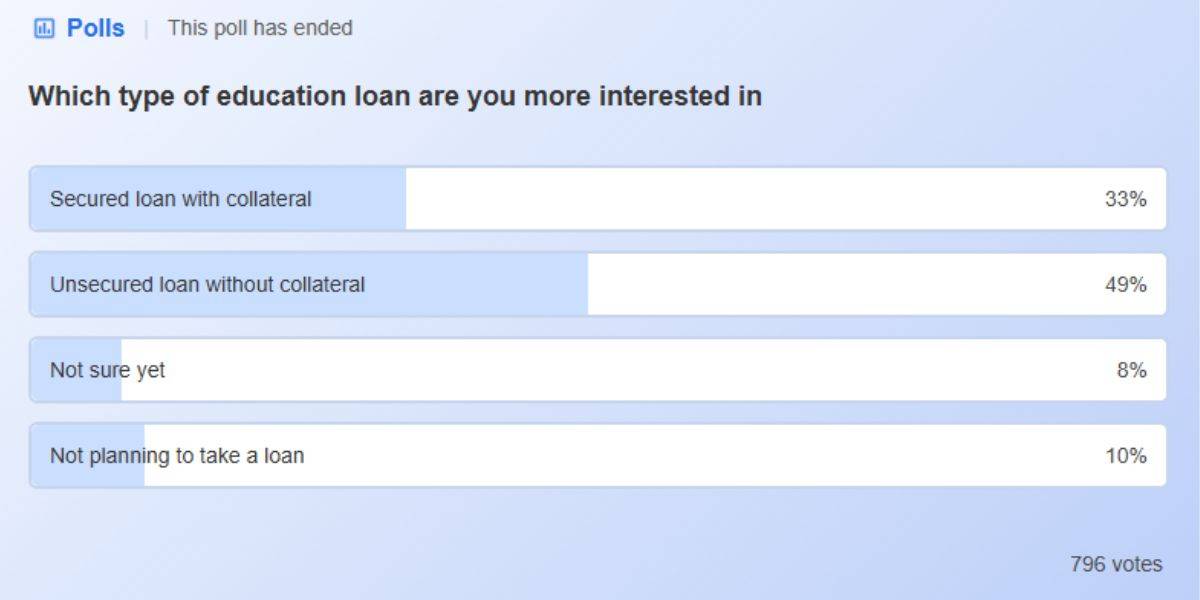Poll Insight: Which Type of Education Loan Are You More Interested in?
With education costs rising, student loans are becoming essential for many. Shiksha Study Abroad conducted a poll to find out which type of education loan students prefer. Around 390 students out of 796 participants said they want to apply for unsecured loans.
There is no doubt that the cost of studying is rising, and not everyone has big pockets. In this case, students choose to borrow an education loan from banks. Study loans have become a crucial financial tool. To understand which type of study loan students prefer, Shiksha Study Abroad conducted a poll. The poll question was 'Which type of education loan are you more interested in?'
A total of 796 participants voted in the poll. 33% chose 'Secured Loan with Collateral,' while 49% indicated they want 'Unsecured Loan without Collateral.' In this article, we will help you understand the complete poll results and address common queries surrounding them.
- Education Loan Poll Results
- Unsecured Loan Without Collateral - 49%
- Secured Loan With Collateral - 33%
- Not Planning To Take a Loan - 10%
- Not Sure Yet - 8%
Education Loan Poll Results
Have a quick look at the actual data of the Shiksha Study Abroad poll in which we have asked “'Which type of education loan are you more interested in?”. As mentioned, a total of 796 students participated in the poll, and the results are here:
Here is the breakdown of poll results.
| Option | Percentage | Number of Votes |
|---|---|---|
| Secured loan with collateral | 33% | 263 |
| Unsecured loan without collateral | 49% | 390 |
| Not sure yet | 8% | 64 |
| Not planning to take a loan | 10% | 79 |
| Total | 100% | 796 |
Now, let's understand every option one by one.
Unsecured Loan Without Collateral - 49%
Nearly half of the participants voted for this option. The growing interest in unsecured education loans can be attributed to their ease of access, faster processing, and the absence of collateral requirements. It means they don't need to pledge anything to the bank against their education loan application. Also, it is a fact in India that many students do not have property or financial assets to pledge. That's why they choose unsecured student loans.
Top education loan providers in India offer unsecured loans based on several factors such as the student's academic profile, the institution’s reputation, and co-applicant's income. Keep in mind, here no collateral is involved; that's why these loans come with higher interest rates and stricter eligibility criteria. Banks and NBFCs make sure that you will repay the loan on time.
Not everyone can get unsecured loans. Such loans are ideal for students attending top universities in the world and studying in-demand programs with good placement potential.
Related Reads:
Predict your IELTS, TOEFL, and PTE in just 4 steps!
Secured Loan With Collateral - 33%
A significant number of respondents still prefer secured education loans. These loans typically offer lower interest rates, longer repayment tenures, and higher loan amounts. All these are great benefits for students going for high-cost courses or premier institutions.
In a secured study loan, the applicant or co-applicant pledges an asset, such as residential or commercial property, fixed deposits, or life insurance policies, as collateral for education loan. Due to the presence of collateral, the risk associated with a loan reduces, and banks can offer students better terms. Some banks can cover your other expenses like travel, living costs, and insurance.
Many students choose secured education loans for higher amounts. Yet, they require detailed paperwork, property checks, and longer processing, so plan early.
Not Planning To Take a Loan - 10%
Around 10% of respondents said that they don’t intend to take a loan. It is not wrong to say that these are lucky students who either have enough budget to fund their studies or were selected for fully funded scholarships. In both cases, they can finance their dream to study abroad, without knocking on the door of any bank or NBFC.
Not Sure Yet - 8%
Total 64 students said that they are still exploring and have not decided to take a loan. These students might still be exploring their study options or lack clarity on loan processes. If you do not have proper knowledge about education loan, you can get counselling for free from our Shiksha Study Abroad team. You can also apply for education loan through Shiksha's portal at one click.
Here are some popular government education loan schemes in India, to fund your higher studies:
- Vidya Lakshmi Portal Education Loan
- Gujarat Government Education Loan for Studying Abroad
- Education Loan Scheme of the NBCFDC
- Padho Pardesh Scheme
- Dr Ambedkar Central Sector Scheme
Pick your stage and get free guidance from counsellors who've helped thousands get into top universities.
 Starting research
Starting research Shortlisting colleges
Shortlisting colleges Exam preparation
Exam preparation SOP/LOR writing
SOP/LOR writing Scholarship & finance
Scholarship & finance Visa application
Visa application



Yes, one can get a good scholarship to study a bachelor's programme abroad given that you will have to search for suitable scholarships available for the country, university and course you are applying to. However, merely applying for the scholarship does not confirm your chance of getting a scholarship. You will have to be prepared and receive the desired merit in your qualifying class 12th exams to win the scholarship award.